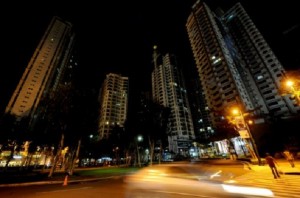Japan funding eyed for feasibility study of P70B BGC monorail

Bonifacio Global City at night. The feasibility study for a P70-billion monorail project at the BGC may be up for Japanese funding, depending on the outcome of a presentation to the National Economic and Development Authority and the Japan International Cooperation Agency in March 2013, according to the Bases Conversion Development Authority. AFP/JAY DIRECTO
The feasibility study for a P70-billion monorail project at the Bonifacio Global City may be up for Japanese funding, depending on the outcome of a presentation to the National Economic and Development Authority (Neda) and the Japan International Cooperation Agency (Jica) next month.
Arnel Casanova, president of the Bases Conversion Development Authority (BCDA), said the target was to present the pre-feasibility study next month to Neda and Jica and a decision would be made if funding for the study could come from the Japanese agency.
Economic Planning Secretary Arsenio Balisacan, who is also Neda director general, noted that the preparation of the feasibility study, if it would proceed, need not be tied to the funding source of the project.
“Normally railways are expensive due to civil works. Other technologies may be considered—for example, trains that run on rubber tires instead of the usual tracks, but the main concerns are that they should entail minimal right of way and must fit the aesthetics of BGC,” Casanova said.
So far, the pre-feasibility study funded by the Japanese Ministry of Economy, Transportation and Industry considered user fees as the main revenue generator for the proposed monorail project but other income streams such as commercial transport hubs and malls complementing the rail line would be studied more closely, Casanova said.
If approved soon, the monorail project can be completed by 2016. The proposed 12.56-kilometer elevated monorail is envisioned to connect BGC to the cities of Makati and Pasay through the Metro Rail Transport (MRT) system as well as the Manila international and domestic airports. The present alignment being considered starts from the MRT 3 (Guadalupe Station), enter Bonifacio Global City through the north gate and end at Ninoy Aquino International Airport Terminal 3 building.
BCDA, which turns military assets into productive civilian use to raise funds for state projects (including the Armed Forces of the Philippines’ modernization program), is also coordinating with various government agencies such as the departments of Transportation and Communications and of Public Works and Highways as well as the PPP Center to have a “complete picture” of infrastructure developments and timelines that might complement or involve the assets managed by the state-owned firm.
